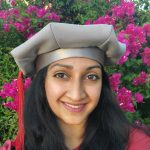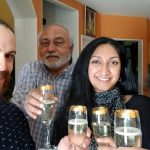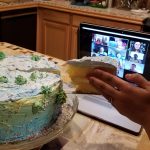From unlocking secrets of Antarctic microbial systems to quarantining in the desert: An interview with Dr. Deepa Rao
Deepa Rao conducted her Ph.D. research within the MIT-WHOI Joint Program in Biological Oceanography, advised by Dr. Mick  Follows. She is a Spring 2020 graduate. Due to the Covid-19 pandemic, our students and faculty have all had to be resilient and resourceful. The last stages of Ph.D. research through the final defense are often stressful in the best of times. Wondering what it would be like to defend a dissertation virtually during a pandemic? Deepa shared her story with me.
Follows. She is a Spring 2020 graduate. Due to the Covid-19 pandemic, our students and faculty have all had to be resilient and resourceful. The last stages of Ph.D. research through the final defense are often stressful in the best of times. Wondering what it would be like to defend a dissertation virtually during a pandemic? Deepa shared her story with me.
What was her research focus? Deepa studied coastal microbial ecosystems in Antarctica. She explored the role of microbial interactions and trace essential nutrients, particularly iron, vitamin B12 and cobalt, in regulating the growth of different types of phytoplankton. Vitamin B12 is particularly interesting because most phytoplankton require it for growth, but it is made exclusively by bacterioplankton and contains cobalt, a rare element in the oceans. To explore the role of these micronutrients, Deepa performed lab experiments with Phaeocystis antarctica in which growth under different iron and B12 concentrations led to different growth forms of the cells (individual vs. colonies), which in turn affected their dependence on the vitamin. Deepa was then able to bring her work into the field through a cruise in which she compared nutrient uptake rates among distinct microbial communities within the Amundsen Sea, Ross Sea and Terra Nova Bay. Finally, she built a model that allowed her to examine the role of nutrient availability and metabolic flexibility in structuring seasonal succession within the phytoplankton community. One outcome of her work is that in some conditions Phaeocystis is favored by an ability to grow without vitamin B12.
How did things change with the Covid-19 pandemic? As Deepa was working hard to complete here analyses and write her thesis chapters, news about the Covid-19 pandemic started to appear increasingly grim. No one was sure exactly how fast infection rates would grow within the U.S., but hospitals were already reporting shortages of critical personal protective equipment. Many of us were worrying about this in an abstract way, but the problem was very real to Deepa. Her mother, a pediatrician, was facing the reality of serving as a front-line medical worker without access to N-95 masks and other supplies. The situation seemed chaotic and dangerous. Eventually, Deepa and her husband decided to fly to Phoenix and do what they could to help out. Deepa scoured the internet and was eventually able to secure supplies that would help keep her mother safe. She stayed in Phoenix, communicating remotely with her thesis committee while she completed the final analyses of her dissertations. Deepa describes it as a stressful time, but explains that the hardest parts were making the decision to travel and the experience of the flight itself. Once she reunited with her family they were able to support each other through uncertainties of the pandemic and the final stretch of Deepa’s graduate work. Deepa also appreciated the consistent support she got from all of her committee members, particularly Mick Follows and Mak Saito.
What was the actual defense like? The thesis defense is idealized as a sort of crowning glory of the time in graduate school. In Deepa’s case, her defense was hosted over Zoom, and I wondered if the experience might have felt disappointing. In reality, Deepa described it as surprisingly wonderful. Nearly one hundred people joined, including friends and mentors from many different times in her life. Among the attendees were grade-school friends, teachers from middle school, and a particularly inspiring high school biology teacher. Deepa appreciates that the virtual format allowed many people to attend who otherwise wouldn’t  have been able to join in person. But what about her family? They got dressed up in honor of the occasion, but thought it would be strange to have them in the same room with her while she was talking to a webcam. She defended upstairs, while her family enjoyed the livestream downstairs in anticipation. After the successful defense, there was a virtual celebration, but Deepa was fortunate to have her family with her to celebrate in person. She points out, “We had a virtual toast, but there was real champagne!” And true to Joint Program tradition, her husband made a cake that was inspired by her thesis topic.
have been able to join in person. But what about her family? They got dressed up in honor of the occasion, but thought it would be strange to have them in the same room with her while she was talking to a webcam. She defended upstairs, while her family enjoyed the livestream downstairs in anticipation. After the successful defense, there was a virtual celebration, but Deepa was fortunate to have her family with her to celebrate in person. She points out, “We had a virtual toast, but there was real champagne!” And true to Joint Program tradition, her husband made a cake that was inspired by her thesis topic.
What’s next? Deepa is doing postdoctoral work in Mick’s lab, working to publish papers based on her research and extending some modeling efforts to incorporate Phaeocystis antarctica. She’s currently working from Phoenix, but she’s hoping to make her way back to Cambridge soon. After her time in Mick’s lab, she will be joining Alex Worden’s lab at GEOMAR Helmholtz Centre for Ocean Research Kiel where she will continue conducting research on microbial interactions using integrative methods. She’s excited to take on new scientific challenges, and on behalf of JPBO, I wish her the very best of luck.
Congratulations Dr. Rao!